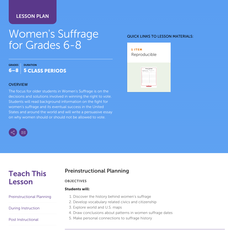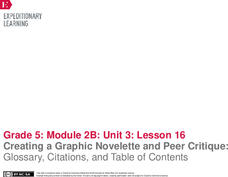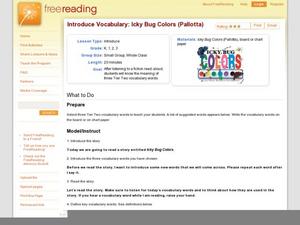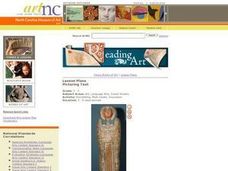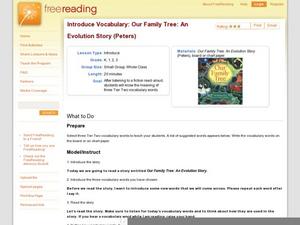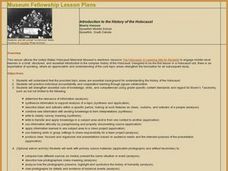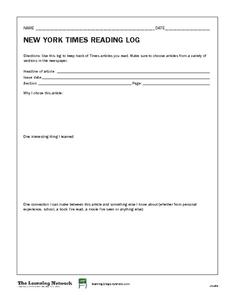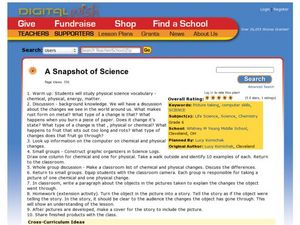Scholastic
Women's Suffrage for Grades 6–8
Learners study the decisions and solutions involved in winning the right to vote. After reading background information on the fight for women's suffrage, including one woman's story, and its eventual success in the United States and...
Curated OER
Geography of Canada
All about Canada! Learners explore the geography and providences of Canada by watching videos, studying maps and conducting internet research. By the end of this lesson, your class should be able to locate major areas and compare and...
Curated OER
Lesson Ideas for Comparing and Contrasting Content
Here are three lesson ideas to help students learn how to compare and contrast information in any content area
University of North Carolina
Evidence
You can claim that soda rots people's teeth or that dinosaurs were actually birds, but your claim will not stand up if it is not backed by evidence. A handout from UNC Writing Center, the seventh in the Writing the Paper series of 24,...
EngageNY
Creating a Graphic Novelette and Peer Critique: Glossary, Citations, and Table of Contents
A, B, C ... let's alphabetize to get organized! Using the informative resource, scholars create an alphabetized glossary of key words for their graphic novelettes. Additionally, they create a table of contents and citations page.
Curated OER
Introduce Vocabulary: Icky Bug Colors (Pallotta)
Get to know the bugs around us with emerging readers who use Jerry Pallotta's informative book Icky Bug Colors to learn vocabulary in context. Address terms before reading the text aloud, preparing kids to listen for them later. Here,...
Bantam Books
The Tempest: Think-Aloud Annotation
It can be difficult to refer back to a text when analyzing it, so annotation is a great tool for kids to track what they are reading. A thorough and well-organized activity guides learners through the process of annotating William...
CK-12 Foundation
Commonsense Composition
Any teacher with common sense should use the perfect resource to improve composition skills. Perfect for flipped lessons and station rotation, the text details information about genres of writing with guiding questions for readers....
Literacy Design Collaborative
Rhetorical Analysis for Pre-AP English
Scholars closely analyze the use of rhetorical strategies in several model texts. They work in groups to annotate the text identifying rhetorical elements, and to complete a Rhetorical Analysis chart and guided reading worksheet....
Curated OER
Picturing Text
Students, through observation and discussion about the Coffin of Djed Mut, make connections between hieroglyphs and the English writing system. They create their own visual story using symbols that represent words.
Curated OER
Introduce Vocabulary: Dinosaur Bones (Barner)
Dig into some prehistoric vocabulary in Bob Barner's informative book Dinosaur Bones. This works best if you introduce the primitive words before reading the story. These are the focus terms in the text: ancient, climate, extinct,...
Curated OER
Introduce Vocabulary: Dolphin's First Day (Zoehfeld)
Travel out to sea as scholars learn vocabulary in context through Kathleen Zoehfeld's informational book Dolphin's First Day. Go over the new words scholars will hear before reading: approach, coast, expert, feeble, gaze, murky, propel,...
Curated OER
Introduce Vocabulary: Our Family Tree: An Evolution Story (Peters)
Lisa Peters presents macroevolution as a large-scale family tree in her book Our Family Tree: An Evolution Story. She suggests the process from single-celled organisms to modern-day humans, and learners explore new vocabulary through the...
Curated OER
Knowing Write from Wrong
Explore how the informality of electronic correspondence has affected communications in the workplace. Writers develop pages for a basic writing guide that contains rules and examples to help correct common writing errors. A great way to...
Curated OER
Introduction to the History of the Holocaust
The Holocaust is unbelievable! Examine this piece of history with your class. Using the Internet, research groups determine the relevance of information presented, compare how different sites present the same information, synthesize...
Curated OER
Zoo-Goers Ready to Greet Baby Panda
The Smithsonian's National Zoo, also known as the Washington Zoo, is one of the oldest zoos in the United States. Youngsters read and discuss a news article about Tai Shan, baby panda that was one of the zoos most famous residents. They...
Scholastic
Thomas Jefferson and Monticello: An Introduction to Writing Historical Fiction
Thomas Jefferson is one of the most recognized names and faces in America—but is there more to the third president of the United States? Upper elementary and middle schoolers conduct research on Jefferson, his famous home at Monticello,...
Curated OER
Introduce Vocabulary: One Tiny Turtle (Davies)
The loggerhead turtle is a fascinating species, and budding readers learn all about it in Nicola Davies' account One Tiny Turtle. This informational narrative offers excellent vocabulary in context, and you'll find guidance here to...
The New York Times
New York Times Reading Log
Inspire your pupils to read the news and make connections between articles and another text, event, or experience with a straightforward reading log. Learners note down the article information at the top of the worksheet and then respond...
Curated OER
Who Was That Man?
Develop historical analysis and interpretation with your older students. They will study and analyze three given interpretations of Christopher Columbus' life, which includes significant events, his character, and the impact he made on...
EngageNY
Grade 9 ELA Module 3, Unit 3, Lesson 3
Plagiarism is the theft of intellectual property. To avoid this crime, class members learn how to create a works cited page and how to craft in-text citations. After examining a high-performance model paragraph and an example of a works...
Curated OER
Introduce Vocabulary: Animal Tracks (Dorros)
What kind of animal made those tracks? Explore some wild vocabulary in context as learners listen to Arthur Dorros' book, Animal Tracks. Before your read this, introduce the new words like bother, dam, reed,...
Curated OER
Introduce Vocabulary: Clouds (Bauer)
What type of cloud is that? Explore meteorological vocabulary using Marion Bauer's book, Clouds (although these strategies could be used for any fiction or nonfiction text). Pre-teach the new words before reading the story aloud....
Curated OER
A Snapshot of Science
Sixth graders explore physical and chemical changes. In this physical science lesson, 6th graders study vocabulary, discuss the changes they see in the world and look up information on chemical and physical changes. Students create...


